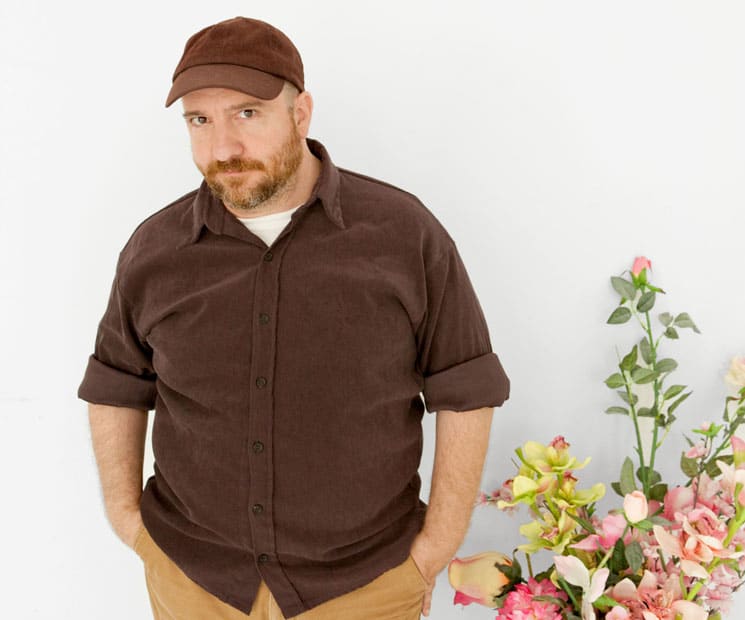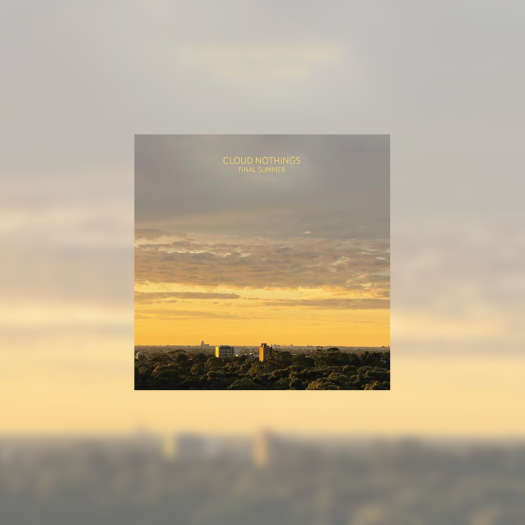Perhaps papa really was a rodeo. On the Magnetic Fields' 50 Song Memoir, songwriter Stephin Merritt's memoir in verse, he mentions St. Thomas, the Virgin Islands, Yonkers, New York, Baden-Baden (a spa town in Southwestern Germany), Syracuse, Woodstock, Paia, Hawaii and Saratoga Springs — and that's just in his first ten years.
The five-disc box set (out March 10 on Nonesuch) details stories from Merritt's life: one song per year starting when he turned one in 1966. Speaking to Exclaim! from his home in Hudson, NY, Merritt explains why he went for this uncharacteristically autobiographical project, suggested to him by Robert Hurwitz (then president of Nonesuch) over lunch at an oyster bar a few months before Merritt's 50th birthday.
"I agreed because you're only 50 once and I thought it would be a good long-term project," Merritt tells Exclaim! "And I have yet to regret it, but maybe someone I mentioned will sue me and I'll regret it horribly. You laugh now…
"I can't honestly say that I remember what parts were my idea, if any. I know the idea of having it on five discs was not mine — it was also Hurwitz's — and I was pleased. Even though it would theoretically fit on two or three, where would you break up the sides?
"With 69 Love Songs, they wouldn't fit on two [CDs]. I was actually furious with Merge when they said that it was going to have to be on three. I thought, 'but two CDs is the whole point! The 6 and the 9 and it's got to be on two.' But where I would have done the side breaks in that case, I don't know either. Anyway, first world problems as they say."
Here are five other insights into the process of creating 50 Song Memoir.
1. Merritt — by his own account — doesn't have a great memory. Luckily he had some helpers.
"I have two first memories and they're both not on the album; one is almost certainly false and I don't know if they would make sense to anyone else," Merritt says.
Because he had trouble remembering where he was and what he was up to over the years (understandable, given he lived in 33 different places by the time he was 22), he enlisted his mother, Alix Merritt, and bandmate Claudia Gonson (who's known him since high school) to help make timelines from which he could generate song ideas.
He also had his old notebooks to draw from. "But that only helped me back to about 1980," he says. "Before that I was not organized enough to keep song notebooks and I have no idea how I functioned at all."
He didn't just use the old notebooks for ideas, he actually used some of his old songs. "I use very old songs to illustrate what was happening in my life," Merritt says. "Which was 'Ethan Fromm' and the song 'At The Pyramid,' which is cobbled together from two different songs from 1986 or 1987; one is the backing track, one is the vocal."
2. The Magnetic Fields have even more instruments to play with now, and they're not afraid to use them.
Listed in order of appearance on the new album are over 100 instruments — familiar and obscure, acoustic and electronic — including many keyboards and percussion instruments and at least one or two repurposed objects, and that's just what Merritt is playing. The Magnetic Fields and special guests, including Thomas Bartlett and Daniel Handler (aka Lemony Snicket) join him on the album. "I think for 69 Love Songs they were in order of type of instrument, percussion and such. Instrument family," he says.
For 50 Song Memoir, Merritt set himself the task of using seven instruments on each song and each instrument seven different times. Did he stick with it? "Mostly, yes," he says. "An average of seven instruments on each song and trying to make sure that no pair of instruments was on more than one song, because otherwise I would have had a pair of instruments on seven different songs and I'd probably still be working on the first batch of seven songs.
"I wanted to avoid too much repetition," he adds. "I like to make the songs as different from each other as possible."
3. Merritt's mom Alix Merritt is a central and recurring character, dragging young Merritt to communes and ashrams and dating dubious musicians, like the one who stole his song lyrics in "It Could Have Been Paradise," about living in Paia, Hawaii in '73.
"My mother's a central character in everything she appears in," Merritt says. "She's a colourful eccentric. I think she was a seeker and was searching for something that doesn't exist. She still does it, but slower now.
"My mother's behaviour has always been mysterious to me," he adds. "It wouldn't occur to me to seek supernatural explanations for any problem at all." Some of the best songs on the album — especially atheist hymn "No" — explore this tension between Merritt's dryly humorous scepticism and his mom's "beatnik" worldview. She's heard the album performed live in its entirety. They still disagree.
4. Merritt's footloose childhood paved the way for a free adulthood, too.
"Yesterday I was driving in a rented car where I had to actually listen to the radio, cause there was no CD player and there was [host of NPR's Fresh Air] Terry Gross — whose voice I recognized within two syllables — and she was interviewing the director of I Am Not Your Negro, the James Baldwin documentary biopic [Raoul Peck]. He was saying that his moving around all the time in his childhood had given him a certain lightness of experience, where things never got too dramatic because he always knew that it was possible to pick up and leave, having done it dozens of times in his life. He knew that things are not so permanent that you can't just go. Including leaving the country.
"I had not thought of it that way until I heard him say it, but I suppose, like my mother, I have a well-developed sense of the rather convenient lightness of being in that you can just pick up and go. You're always reading about people who shoot their families and such because their situations have become intolerable. People feel trapped. Russian literature would not exist without people feeling trapped. But people are not really trapped, at least not now. So anyway, that is I guess part of the impact of me moving around all the time. You know you are perfectly free to move around more."
5. It's a shame about math, though.
"What sucked was taking long division six different times in six different schools six different ways and now I can't do long division. I've also never taken factoring. I have a friend who teaches elementary school who taught me factoring in the intermission of a Broadway play. I don't know the technique, but I understand the concept. I never learned it in school at all."
The Magnetic Fields will bring 50 Song Memoir to Toronto soon, with a "stripped-down" ensemble playing 50 instruments. The evocative stage setup will include antique knickknacks and vintage tin dollhouses from the 1940s to '60s. What is it about the doll houses? "Um, imagining I live there of course," says Merritt. "I find it very difficult to pass a realtor window without looking at all the little houses I could live in. I call it pornography. Real estate porn."
The five-disc box set (out March 10 on Nonesuch) details stories from Merritt's life: one song per year starting when he turned one in 1966. Speaking to Exclaim! from his home in Hudson, NY, Merritt explains why he went for this uncharacteristically autobiographical project, suggested to him by Robert Hurwitz (then president of Nonesuch) over lunch at an oyster bar a few months before Merritt's 50th birthday.
"I agreed because you're only 50 once and I thought it would be a good long-term project," Merritt tells Exclaim! "And I have yet to regret it, but maybe someone I mentioned will sue me and I'll regret it horribly. You laugh now…
"I can't honestly say that I remember what parts were my idea, if any. I know the idea of having it on five discs was not mine — it was also Hurwitz's — and I was pleased. Even though it would theoretically fit on two or three, where would you break up the sides?
"With 69 Love Songs, they wouldn't fit on two [CDs]. I was actually furious with Merge when they said that it was going to have to be on three. I thought, 'but two CDs is the whole point! The 6 and the 9 and it's got to be on two.' But where I would have done the side breaks in that case, I don't know either. Anyway, first world problems as they say."
Here are five other insights into the process of creating 50 Song Memoir.
1. Merritt — by his own account — doesn't have a great memory. Luckily he had some helpers.
"I have two first memories and they're both not on the album; one is almost certainly false and I don't know if they would make sense to anyone else," Merritt says.
Because he had trouble remembering where he was and what he was up to over the years (understandable, given he lived in 33 different places by the time he was 22), he enlisted his mother, Alix Merritt, and bandmate Claudia Gonson (who's known him since high school) to help make timelines from which he could generate song ideas.
He also had his old notebooks to draw from. "But that only helped me back to about 1980," he says. "Before that I was not organized enough to keep song notebooks and I have no idea how I functioned at all."
He didn't just use the old notebooks for ideas, he actually used some of his old songs. "I use very old songs to illustrate what was happening in my life," Merritt says. "Which was 'Ethan Fromm' and the song 'At The Pyramid,' which is cobbled together from two different songs from 1986 or 1987; one is the backing track, one is the vocal."
2. The Magnetic Fields have even more instruments to play with now, and they're not afraid to use them.
Listed in order of appearance on the new album are over 100 instruments — familiar and obscure, acoustic and electronic — including many keyboards and percussion instruments and at least one or two repurposed objects, and that's just what Merritt is playing. The Magnetic Fields and special guests, including Thomas Bartlett and Daniel Handler (aka Lemony Snicket) join him on the album. "I think for 69 Love Songs they were in order of type of instrument, percussion and such. Instrument family," he says.
For 50 Song Memoir, Merritt set himself the task of using seven instruments on each song and each instrument seven different times. Did he stick with it? "Mostly, yes," he says. "An average of seven instruments on each song and trying to make sure that no pair of instruments was on more than one song, because otherwise I would have had a pair of instruments on seven different songs and I'd probably still be working on the first batch of seven songs.
"I wanted to avoid too much repetition," he adds. "I like to make the songs as different from each other as possible."
3. Merritt's mom Alix Merritt is a central and recurring character, dragging young Merritt to communes and ashrams and dating dubious musicians, like the one who stole his song lyrics in "It Could Have Been Paradise," about living in Paia, Hawaii in '73.
"My mother's a central character in everything she appears in," Merritt says. "She's a colourful eccentric. I think she was a seeker and was searching for something that doesn't exist. She still does it, but slower now.
"My mother's behaviour has always been mysterious to me," he adds. "It wouldn't occur to me to seek supernatural explanations for any problem at all." Some of the best songs on the album — especially atheist hymn "No" — explore this tension between Merritt's dryly humorous scepticism and his mom's "beatnik" worldview. She's heard the album performed live in its entirety. They still disagree.
4. Merritt's footloose childhood paved the way for a free adulthood, too.
"Yesterday I was driving in a rented car where I had to actually listen to the radio, cause there was no CD player and there was [host of NPR's Fresh Air] Terry Gross — whose voice I recognized within two syllables — and she was interviewing the director of I Am Not Your Negro, the James Baldwin documentary biopic [Raoul Peck]. He was saying that his moving around all the time in his childhood had given him a certain lightness of experience, where things never got too dramatic because he always knew that it was possible to pick up and leave, having done it dozens of times in his life. He knew that things are not so permanent that you can't just go. Including leaving the country.
"I had not thought of it that way until I heard him say it, but I suppose, like my mother, I have a well-developed sense of the rather convenient lightness of being in that you can just pick up and go. You're always reading about people who shoot their families and such because their situations have become intolerable. People feel trapped. Russian literature would not exist without people feeling trapped. But people are not really trapped, at least not now. So anyway, that is I guess part of the impact of me moving around all the time. You know you are perfectly free to move around more."
5. It's a shame about math, though.
"What sucked was taking long division six different times in six different schools six different ways and now I can't do long division. I've also never taken factoring. I have a friend who teaches elementary school who taught me factoring in the intermission of a Broadway play. I don't know the technique, but I understand the concept. I never learned it in school at all."
The Magnetic Fields will bring 50 Song Memoir to Toronto soon, with a "stripped-down" ensemble playing 50 instruments. The evocative stage setup will include antique knickknacks and vintage tin dollhouses from the 1940s to '60s. What is it about the doll houses? "Um, imagining I live there of course," says Merritt. "I find it very difficult to pass a realtor window without looking at all the little houses I could live in. I call it pornography. Real estate porn."




